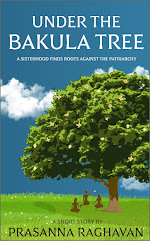Fiction and Conflicts help us survive as a life simulator.
Fiction evolved as a natural selection by homo-sapiens as they acquired a lifestyle of earning subsistence through hunting and foraging and by living in groups. It was for learning more about their own kind and how they resolve conflicts in their social lives. It helped them experience the emotions of a fictional conflict as a flight simulator for their survival.
This is my second post for the Bookish League Bloghop Challenge. The first post was Why Do We Tell Stories? Hunter-gatherer's Shed Light on It.
This post might render less use without reading the first post. Hence, I highlight a few points to benefit those who still need to read it or forgot it. Also, I have fine-tuned the first post for clarity.
Highlights from my first post.
- Fiction and storytelling pertain to the adaptations that have evolved in response to characteristically adaptive problems that have shaped our ancestors' lifestyles as hunter-gatherers more than 200 thousand years ago. Hunter-gatherers were prehistoric nomadic groups on Earth's surface whose culture shaped the cognitive development of the human species, homo-sapiens.
- They mark a crucial phase in the development of the human race marked by their inventions, lifestyle, biological and mental development, human cognition and sociality. They invented language, narrative and fiction. Language played a unique role in allowing them to instruct others' imagination and share expressed ideas between individuals.
- Hunter-gatherers lived in social groups. Storytelling evolved as an adaptation for problem-solving, social monitoring, and gaining knowledge of how others resolve conflicts and problems. Adaptive evolution pertains to evolutionary changes in an organism that make it suitable for its habitat.
- Only humans have invented language compared to other species on Earth. Language happened from the hunter-gatherers' pressure of dependency on one another and to pool more information about others. It allowed early humans to learn much more about their kind than they could experience first-hand.
- So, language narrative and fiction created niches that altered the selection pressures and made us more dependent on knowing more about our own kind, risks, and opportunities than we could discover through direct experiences.
For more, go to the link: Why do We Tell Stories? Hunter-gatherers shed light on it.
Fiction and Conflicts Help Us Survive as a Life-Simulator.
When I started writing fiction, the first caution that hit me was that if there were no conflicts, then no story. The same warning reeled in every education I received after that. But why? I am still waiting to hear someone explain the need for conflicts in fiction scientifically and logically. So, I simply copied and pasted it into my brain. Thanks to my research on the storytelling series I am doing now.
What about you? If you also have copied and pasted it, you will be happy to unwind it and get a logical answer. If so, get ready and read on.
This post describes the following points.
1. When a person engages emotionally in a story, they 'experience' it in their brain patterns.
Neurobiologists have discovered that when a person is emotionally immersed in a story, their brain patterns are similar to how that person actually performs what they are reading about or watching. That means when people read or watch a story, they live in its emotions regarding their brain patterns. The fear, excitement, and other feelings they experience are real in terms of their brain patterns.
2. Flight simulation.
As explained in my first post, hunter-gatherers have begun telling stories ever since they became sapiens. This was to learn about their own kind and how they deal with the risk and survival. Evolutionary psychologists term this as 'adaptation.' The behaviour of storytelling was selected by our ancestors for survival, and it is in our genes. The behaviour remains with us as a safety mechanism, or its purpose is our survival as a species.
This is a comparison to a flight simulation. In-flight simulators, pilots practice flying for an indefinite number of times until flying an aircraft becomes second nature to them. The practice in the simulator lasts until they need not consciously think about flying a plane, or it comes automatically. Flying in the simulator made their brains practice the risks and dangers of flying an aircraft without really flying it.
In the same way, storytelling or fiction gives humans the same emotional experience in social conflicts, risks and survival in their brain patterns without experiencing them in real life. Stories are everywhere for us to consume them to avoid risks in life and learn from others' experiences. We read stories from a young age, starting with bedtime stories for the same purpose.
3. Since when have Hunter-gatherers started storytelling?
The need for storytelling evolved as a selection made by the homo-sapiens ever since they started living in groups.
Living in groups increases our safety. On the reaction side, that brings conflicts, too. People in groups behave in different ways. Some turn alleys, some fall in love, and some mate; all have the potential for conflicts. The disputes also come from outside the groups. Avoiding the risks in those patterns of social behaviour was a real-time challenge the hunter-gatherers faced in their times. They selected fiction as a life simulator to avoid the dangers of real-life conflicts.
In fiction, a group of characters act out conflicts; every scene shows how they approach the solution. Fiction allows us to practice disputes in a safe atmosphere as a life simulator.
The stories we read may not be realistic, but it does not matter as long as the emotions and feelings make our brain experience them in actual brain patterns and learn lessons from them. That helps us to survive in real life using conflict resolution we have learned in fictional situations.
Hence, stories are not simply for entertainment. Reading stories is a behaviour in our geans based on the adaptations our ancestors, the homo-sapiens, acquired as a natural selection.
4. The framework of the fiction we construct.
This teaches us that fiction must follow a specific framework to function as a life simulator. Our characters face conflicts from within or outside, but they must solve them using the cause and effect methods.
Conclusion.
When have you learned about the significance of character conflicts in fiction? Do you have any doubts regarding why that happened? If so, have you found my post to be of any help to you in clarifying those doubts or concerns? Please share your responses as comments for us all to discuss further as fiction writers.
This post is part of the Bookish League blog hop hosted by Bohemian Bibliophile.








3 comments
testing
ReplyDeleteThis comment has been removed by the author.
ReplyDeleteGood article particularly in today's context.
ReplyDeletePost a Comment